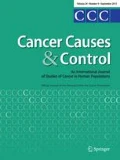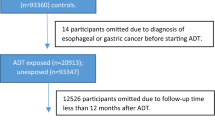Abstract
Purpose
Androgens are known to play an important protective role on colorectal carcinogenesis, and thus the objective of this study was to determine whether androgen deprivation therapy (ADT) is associated with an increased risk of incident colorectal cancer in patients with prostate cancer.
Methods
We conducted a population-based cohort study within the UK General Practice Research Database population which included all patients newly diagnosed with prostate cancer between 1 January 1988 and 31 December 2008, followed until 31 December 2009. Time-dependent Cox proportional hazards models were used to estimate hazard ratios (HRs) and 95 % confidence intervals (CIs) of incident primary colorectal cancer associated with the use of ADT. Secondary analyses considered cumulative duration of use and specific ADTs.
Results
The cohort included a total of 21,503 patients, of whom 184 were diagnosed with colorectal cancer during a mean (SD) follow-up 4.0 (3.0) years (rate 2.4/1,000 person-years). Overall, use of ADT was not associated with an increased risk of colorectal cancer (HR 0.99, 95 % CI 0.73–1.35). Similarly, no association was observed in terms of duration use, although this secondary analysis may have been limited by statistical power. With respect to specific ADTs, bilateral orchiectomy was the only therapy associated with an increased risk of colorectal cancer (HR 2.50, 95 % CI 1.13–5.52).
Conclusion
Overall, the use of ADT is not associated with an increased risk of incident colorectal cancer. The increased risk observed with bilateral orchiectomy may possibly be due to the prolonged androgen suppression of this therapy.

Similar content being viewed by others
References
Taylor LG, Canfield SE, Du XL (2009) Review of major adverse effects of androgen-deprivation therapy in men with prostate cancer. Cancer 115(11):2388–2399
Levine GN, D’Amico AV, Berger P, Clark PE, Eckel RH, Keating NL, Milani RV, Sagalowsky AI, Smith MR, Zakai N; American Heart Association Council on Clinical Cardiology and Council on Epidemiology and Prevention, the American Cancer Society, and the American Urological Association (2010) Androgen-deprivation therapy in prostate cancer and cardiovascular risk: a science advisory from the American Heart Association, American Cancer Society, and American Urological Association: endorsed by the American Society for Radiation Oncology. Circulation 121(6):833–840
Shahinian VB, Kuo YF, Freeman JL, Orihuela E, Goodwin JS (2005) Increasing use of gonadotropin-releasing hormone agonists for the treatment of localized prostate carcinoma. Cancer 103(8):1615–1624
Braga-Basaria M, Muller DC, Carducci MA, Dobs AS, Basaria S (2006) Lipoprotein profile in men with prostate cancer undergoing androgen deprivation therapy. Int J Impot Res 18(5):494–498
Braga-Basaria M, Dobs AS, Muller DC et al (2006) Metabolic syndrome in men with prostate cancer undergoing long-term androgen-deprivation therapy. J Clin Oncol 24(24):3979–3983
Smith MR, Finkelstein JS, McGovern FJ et al (2002) Changes in body composition during androgen deprivation therapy for prostate cancer. J Clin Endocrinol Metab 87(2):599–603
Smith MR, Lee H, Fallon MA, Nathan DM (2008) Adipocytokines, obesity, and insulin resistance during combined androgen blockade for prostate cancer. Urology 71(2):318–322
Smith MR (2004) Changes in fat and lean body mass during androgen-deprivation therapy for prostate cancer. Urology 63(4):742–745
Gillessen S, Templeton A, Marra G, Kuo YF, Valtorta E, Shahinian VB (2010) Risk of colorectal cancer in men on long-term androgen deprivation therapy for prostate cancer. J Natl Cancer Inst 102(23):1760–1770
Izbicki JR, Hamilton SR, Wambach G et al (1990) Effects of androgen manipulations on chemically induced colonic tumours and on macroscopically normal colonic mucosa in male Sprague-Dawley rats. Br J Cancer 61(2):235–240
Aoki K, Nakajima A, Mukasa K, Osawa E, Mori Y, Sekihara H (2003) Prevention of diabetes, hepatic injury, and colon cancer with dehydroepiandrosterone. J Steroid Biochem Mol Biol 85(2–5):469–472
Cooperberg MR, Grossfeld GD, Lubeck DP, Carroll PR (2003) National practice patterns and time trends in androgen ablation for localized prostate cancer. J Natl Cancer Inst 95(13):981–989
Walley T, Mantgani A (1997) The UK General Practice Research Database. Lancet 350(9084):1097–1099
Jick H, Jick SS, Derby LE (1991) Validation of information recorded on general practitioner based computerised data resource in the United Kingdom. BMJ 302(6779):766–768
Lawrenson R, Todd JC, Leydon GM, Williams TJ, Farmer RD (2000) Validation of the diagnosis of venous thromboembolism in general practice database studies. Br J Clin Pharmacol 49(6):591–596
Jick SS, Kaye JA, Vasilakis-Scaramozza C et al (2003) Validity of the general practice research database. Pharmacotherapy 23(5):686–689
Jick H, Jick S, Derby LE, Vasilakis C, Myers MW, Meier CR (1997) Calcium-channel blockers and risk of cancer. Lancet 349(9051):525–528
Garcia-Rodriguez LA, Huerta-Alvarez C (2001) Reduced risk of colorectal cancer among long-term users of aspirin and nonaspirin nonsteroidal antiinflammatory drugs. Epidemiology 12(1):88–93
Hall GC, Roberts CM, Boulis M, Mo J, MacRae KD (2005) Diabetes and the risk of lung cancer. Diabetes Care 28(3):590–594
Gonzalez-Perez A, Garcia Rodriguez LA (2005) Prostate cancer risk among men with diabetes mellitus (Spain). Cancer Causes Control 16(9):1055–1058
van Staa TP, Patel D, Gallagher AM, de Bruin ML (2012) Glucose-lowering agents and the patterns of risk for cancer: a study with the General Practice Research Database and secondary care data. Diabetologia 55(3):654–665
Prostate cancer: Diagnosis and treatment. National Collaborating Centre for Cancer. London (UK): National Institute for Health and Clinical Excellence (NICE); 2008 Feb. 146 p. (NICE clinical guideline; no. 58). http://guidelines.gov/content.aspx?id=14315&search=prostate+cancer+2008. Accessed 21 Dec 2012
Castagnetta L, Traina A, Campisi I et al (2002) Androgen receptor status in nontumoral and malignant human colorectal tissues. Ann NY Acad Sci 963:322–325
Meggouh F, Lointier P, Saez S (1991) Sex steroid and 1,25-dihydroxyvitamin D3 receptors in human colorectal adenocarcinoma and normal mucosa. Cancer Res 51(4):1227–1233
Rao S, Porter DC, Chen X, Herliczek T, Lowe M, Keyomarsi K (1999) Lovastatin-mediated G1 arrest is through inhibition of the proteasome, independent of hydroxymethyl glutaryl-CoA reductase. Proc Natl Acad Sci USA 96(14):7797–7802
Van der Flier LG, Sabates-Bellver J, Oving I et al (2007) The intestinal Wnt/TCF signature. Gastroenterology 132(2):628–632
Chesire DR, Isaacs WB (2002) Ligand-dependent inhibition of beta-catenin/TCF signaling by androgen receptor. Oncogene 21(55):8453–8469
Shah S, Hecht A, Pestell R, Byers SW (2003) Trans-repression of beta-catenin activity by nuclear receptors. J Biol Chem 278(48):48137–48145
Suissa S (2008) Immortal time bias in pharmaco-epidemiology. Am J Epidemiol 167(4):492–499
Strom BL, Melmon KL (1994) The use of pharmacoepidemiology to study beneficial drug effects. Pharmacoepidemiology. Wiley, Chichester
Strom BL, Melmon K (1994) The use of pharmacoepidemiology to study beneficial drug effects. In: Strom BL (ed) pharmacoepidemiology, 2nd edn. Wiley, Chichester, pp 611–628
Acknowledgments
Dr. Laurent Azoulay is the recipient of a ‘Chercheur-Boursier’ award from the Fonds de la recherche en santé du Québec, and Dr. Samy Suissa is the recipient of the James McGill Chair. Data were acquired with a grant from Prostate Cancer Canada.
Author information
Authors and Affiliations
Corresponding author
Electronic supplementary material
Below is the link to the electronic supplementary material.
Rights and permissions
About this article
Cite this article
Assayag, J., Yin, H., Benayoun, S. et al. Androgen deprivation therapy and the risk of colorectal cancer in patients with prostate cancer. Cancer Causes Control 24, 839–845 (2013). https://doi.org/10.1007/s10552-012-0132-6
Received:
Accepted:
Published:
Issue Date:
DOI: https://doi.org/10.1007/s10552-012-0132-6




